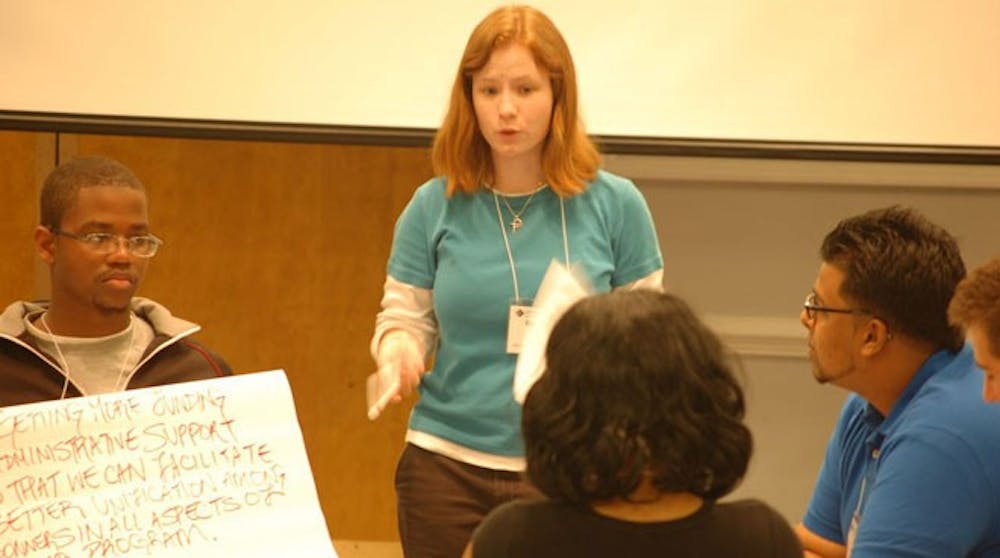The University of Richmond hosted the 2009 Bonner Congress for the first time since the conference's 1997 inception, giving 170 Bonner Scholars from colleges across the United States an opportunity to further their service projects and combat student apathy on their campuses.
Edward Ayers, Richmond's president, and Wayne Meisel, president of The Corella and Bertram F. Bonner Foundation, kicked off the conference with inspirational speeches to the scholars in the Alice Haynes Room of the Tyler Haynes Commons Friday evening.
"I've lived across other times," Ayers said, "like the time that I was in college right at the end of the '60s, early '70s - I still kind of have the hair from it and all that stuff - and we could talk the talk ... about changing the world, but we didn't do anything much.
"But I see in this generation a sort of recognition that we can change things in profound ways."
Meisel, a Harvard graduate who also helped establish the Bonner Foundation, echoed the same sentiments, saying he thought idealism was the nature of students.
"If you believe idealism is the nature of students, then that means that we are called to get out there and get everybody involved, not to sit and feel defeated," he said.
Meisel also challenged the scholars to transcend elementary service programs - using "Bottle Caps for Africa" as an example - and engage in college-level community service.
Emily Blevins, a Westhampton College freshman from Chattanooga, Tenn., used a networking session on Saturday to raise student awareness about the controversial murder trial of Troy Davis, a Georgia man who has been on death row since 1991 after being convicted of murdering a police officer in Savannah, Georgia on August 19, 1989. There is much dispute over whether Davis committed the crime.
Blevins had learned about the Davis case in high school, she said. "I read about what was happening to Troy and decided his was a case that deserved attention," she said. "It seemed like a no-brainer that people would understand. It wasn't a partisan issue or a death penalty issue, but a justice issue that should concern all of humanity."
Meredith Dodson, director of domestic campaigns for RESULTS, a nonprofit organization that combats world poverty and hunger, held a workshop that gave Bonner Scholars tips on how to use the media to raise awareness in their communities and achieve their goals. Dodson told the scholars to use new technology such as Facebook, but also urged them not to forget about the impact of print media and letters to the editor.
David Karas, a sophomore Bonner Congress representative from The College of New Jersey in Ewing, N.J., and leader of the Social Media Team - responsible for letting his campus know about Bonner events in order to attract interested parties - within his school's Bonner program had already had success in getting his program media exposure.
"If [our community] gets to meet us or read about us on a constant basis or see us on TV, they might be more encouraged to get involved," he said. "So many things happen just because they hear about us and make a phone call."
Enjoy what you're reading?
Signup for our newsletter
Karas was impressed with Richmond's new UR Downtown and the possibilities it afforded students, adding that he wished his school had a similar facility.
"I think it is really great to have Bonners spending so much time in the same community that they serve," he said. "It also helps to break down any barriers between the campus and the community."
Phil Vazquez, a Bonner Congress representative from Middlesex County College in Edison, N.J., had goals similar to Karas'. Middlesex's Bonner program will always be willing to work alongside any students interested in giving back to the community, he said.
He and his fellow representatives also expressed an interest in collaborating with specific professors or academic departments to incorporate fields of study into service.
"If we have language majors then we can provide opportunities to apply that on our immigration service team," he said. "If we have science majors maybe they can take some children from our urban communities to a theme park ... [and talk to them] about the physics of everything."
Students said they left Richmond on Sunday feeling inspired and ready to make their goals realities. Meeting people with similar ideas and promoting a student voice is very inspiring, said Kelly Behrend, a Westhampton College senior who spent all of last year conducting her 600 hours of Bonner service work studying conflict resolution while abroad in the Basque Country and Northern Ireland.
Officials at Richmond's Bonner Center for Civic Engagement had known they wanted Richmond - home to the largest Bonner Scholar Program in the country - to host a Bonner Congress since 2007, said Kimberly Dean, a Richmond alumna and the director of Richmond's Bonner Scholars Program. They just needed the time to prepare, she said.
Dean said she hoped the weekend would encourage Bonner Scholars to remember and even come back to Richmond.
"I really hope ... they appreciate the richness of our campus and our city and our program and really consider using us as a resource for other service through their programs," she said.
Contact staff writer Guv Callahan at guv.callahan@richmond.edu
Support independent student media
You can make a tax-deductible donation by clicking the button below, which takes you to our secure PayPal account. The page is set up to receive contributions in whatever amount you designate. We look forward to using the money we raise to further our mission of providing honest and accurate information to students, faculty, staff, alumni and others in the general public.
Donate Now



